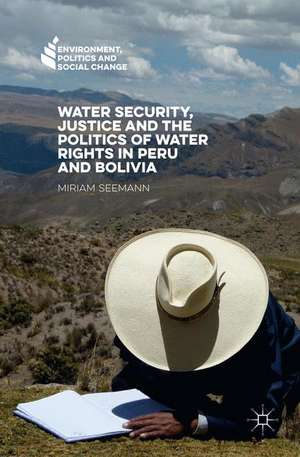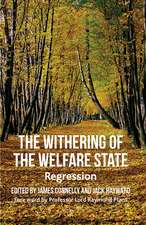Water Security, Justice and the Politics of Water Rights in Peru and Bolivia: Environment, Politics and Social Change
Autor Miriam Seemannen Limba Engleză Hardback – 6 ian 2016
| Toate formatele și edițiile | Preț | Express |
|---|---|---|
| Paperback (1) | 382.75 lei 6-8 săpt. | |
| Palgrave Macmillan UK – 11 feb 2020 | 382.75 lei 6-8 săpt. | |
| Hardback (1) | 388.90 lei 6-8 săpt. | |
| Palgrave Macmillan UK – 6 ian 2016 | 388.90 lei 6-8 săpt. |
Preț: 388.90 lei
Nou
Puncte Express: 583
Preț estimativ în valută:
74.41€ • 77.90$ • 61.57£
74.41€ • 77.90$ • 61.57£
Carte tipărită la comandă
Livrare economică 05-19 aprilie
Preluare comenzi: 021 569.72.76
Specificații
ISBN-13: 9781137545220
ISBN-10: 1137545224
Pagini: 226
Ilustrații: XVIII, 226 p.
Dimensiuni: 140 x 216 x 16 mm
Greutate: 0.44 kg
Ediția:1st ed. 2016
Editura: Palgrave Macmillan UK
Colecția Palgrave Macmillan
Seria Environment, Politics and Social Change
Locul publicării:London, United Kingdom
ISBN-10: 1137545224
Pagini: 226
Ilustrații: XVIII, 226 p.
Dimensiuni: 140 x 216 x 16 mm
Greutate: 0.44 kg
Ediția:1st ed. 2016
Editura: Palgrave Macmillan UK
Colecția Palgrave Macmillan
Seria Environment, Politics and Social Change
Locul publicării:London, United Kingdom
Cuprins
Foreword: Divergent Water Securities and the Politics of Formalization; Rutgerd Boelens
1. Water Security, Formalization and Water Justice
2. Property Rights in Water Resources Management
3. Legal Pluralism and the Political Ecology of Water
4. Water Security and Equity for Peasant and Indigenous Communities in the Peruvian Highlands
5. The Formal Recognition of Local Water Rights in Peru
6. The Formal Recognition of Local Water Rights in Yanque, Colca Valley, Peru
7. Water Security and Equity for Peasant and Indigenous Communities in the Bolivian Highlands
8. The Formal Recognition of Local Water Rights in Bolivia
9. The Formal Recognition of Local Water Rights in Cochimita, Tiraque Valley, Bolivia
10. Conclusion – the Politics of Water Rights Formalization and the Missing Ingredient of Water Security
1. Water Security, Formalization and Water Justice
2. Property Rights in Water Resources Management
3. Legal Pluralism and the Political Ecology of Water
4. Water Security and Equity for Peasant and Indigenous Communities in the Peruvian Highlands
5. The Formal Recognition of Local Water Rights in Peru
6. The Formal Recognition of Local Water Rights in Yanque, Colca Valley, Peru
7. Water Security and Equity for Peasant and Indigenous Communities in the Bolivian Highlands
8. The Formal Recognition of Local Water Rights in Bolivia
9. The Formal Recognition of Local Water Rights in Cochimita, Tiraque Valley, Bolivia
10. Conclusion – the Politics of Water Rights Formalization and the Missing Ingredient of Water Security
Recenzii
"This book, without exaggeration, importantly contributes to understanding the formulation and workings of policies in a key field of development intervention in the Andean Region, and thereby makes a strong contribution to the field of 'the politics of policy' in natural resource management studies. Miriam Seemann gives a profound, refreshing and very creative response to the currently widespread 'rights formalization policies' that, despite their intentions of helping the poor, often have a dramatic impact on the lives and livelihoods of precisely these groups." - Rutgerd Boelens, Professor of the Political Ecology of Water in Latin America, CEDLA, University of Amsterdam, The Netherlands
Notă biografică
Miriam Seemann is an associate researcher at the German Institute of Global and Area Studies (GIGA), Germany. She received her PhD from the University of Hamburg and holds an MA in Intercultural Conflict Management from the Alice Salomon University of Applied Sciences, Berlin. Her current research focuses on natural resource management, social struggles and peace and conflict studies. She is a member of the Justicia Hídrica / Water Justice Alliance.
Textul de pe ultima copertă
The author scrutinizes the claim of policy-makers and experts that legal recognition of local water rights would reduce water conflict and increase water security and equality for peasant and indigenous water users. She analyzes two distinct 'top-down' and 'bottom-up' formalization policies in Peru and Bolivia - neoliberal the former, indigenist-socialist the latter. The policies have intended and unintended consequences and impact on marginalized peasants and the complex inter-legal systems for providing water security on the ground. This study seeks to debunk the official myth of the need to create state-centric, top-down legal security in complex, pluralistic water realities. The engagement between formal and alternative 'water securities' and controversial notions of 'rightness' is interwoven and contested; a complex setting is unveiled that forbids one-size-fits-all solutions. Peru's and Bolivia's case studies demonstrate how formalization policies, while aiming to enhance inclusion, in practice actually reinforce exclusion of the marginalized. Water rights formalization is certainly no panacea.
















